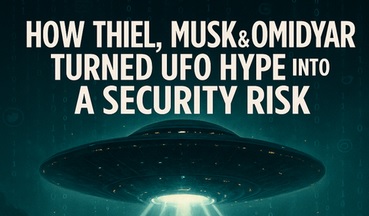Executive Summary: How Thiel, Musk & Omidyar Turned UFO Hype into a Security Risk
Download the FULL paper free HERE
This comprehensive analysis by USAF veteran Jeremy McGowan investigates how the convergence of billionaire tech influencers and UFO disclosure advocates has created significant national security vulnerabilities[1]. The paper identifies a network of key players—Peter Thiel, Elon Musk, Pierre Omidyar, Luis Elizondo, and Dr. Garry Nolan—whose combined influence has transformed UFO discourse from fringe speculation to mainstream concern, often at the expense of operational security and institutional trust[1].
Key Findings
- Authoritative façade with thin evidence: Prominent voices like Elizondo and Nolan make extraordinary claims while leveraging their credentials, causing misinformation to spread faster than official rebuttals[1].
- Billionaire amplification loop: Thiel, Musk, and Omidyar promote unvetted narratives through their media platforms and financial backing, eroding institutional trust and potentially exposing intelligence methods[1].
- Operational security vulnerabilities: The push for “radical transparency” risks revealing sensitive sensor specifications and detection capabilities that adversaries could exploit[1].
- Institutional destabilization: “Deep state” rhetoric justifies targeting career experts, potentially leading to expertise loss and intelligence politicization[1].
- Information environment degradation: Viral conspiracy content outcompetes validated threat reporting, making the population susceptible to adversary information operations[1].
The risk matrix identifies severe threats to national security, particularly around exposing sensor capabilities, institutional distrust, and creating openings for adversary reflexive control operations[1].
Conclusion
McGowan’s analysis reveals how a seemingly benign quest for UFO “disclosure” may serve agendas that undermine U.S. national security and constitutional governance[1]. While legitimate inquiry into Unidentified Aerial Phenomena is warranted, the current approach dominated by sensationalism and unverified claims creates dangerous vulnerabilities[1].
The confluence of Thiel’s anti-democratic ideology, Musk’s information amplification capabilities, Omidyar’s transparency crusade, and the credibility-lending of figures like Elizondo and Nolan has created a perfect storm[1]. This network has successfully shifted public perception, with recent polls showing over 55% of Americans now believing the government conceals knowledge about extraterrestrial life—up significantly from 35% five years ago[1].
This erosion of institutional trust has profound implications for national security, as it:
- Creates fertile ground for adversarial exploitation of public confusion
- Risks exposing classified capabilities and methodologies
- Weakens the credibility of legitimate government communications
- Fosters conditions that could facilitate shifts toward more authoritarian governance structures[1]
The author concludes that without rigorous evidentiary standards and nuanced oversight mechanisms replacing viral sensationalism, the United States risks trading classified advantages and civic cohesion for speculative headlines—potentially serving interests fundamentally misaligned with constitutional governance[1].
Read and download the full paper HERE

